STORY about EnvironmentIndigenousSolidaritypublié le mars 25, 2011 by SandraCuffe
No Consent? No Pipeline!
Rally at Bank of Montreal meeting supports Yinka Dene Alliance against Enbridge pipeline
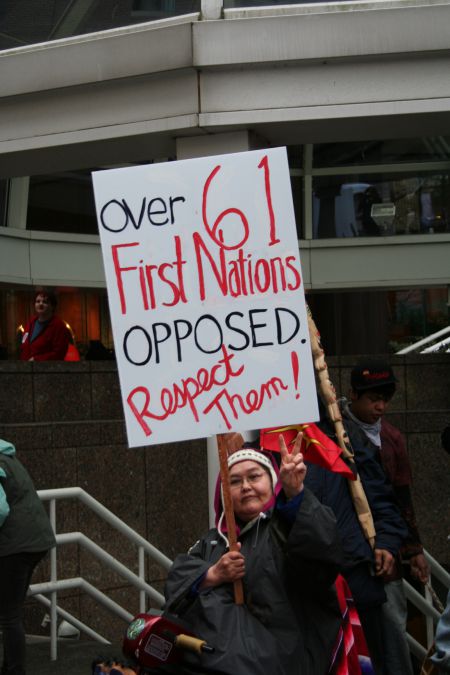
Wet'suwet'en Indigenous activist Telqua highlights widespread Indigenous opposition to Enbridge's Northern Gateway project. Vancouver, March 22, 2011. Photo: Sandra Cuffe
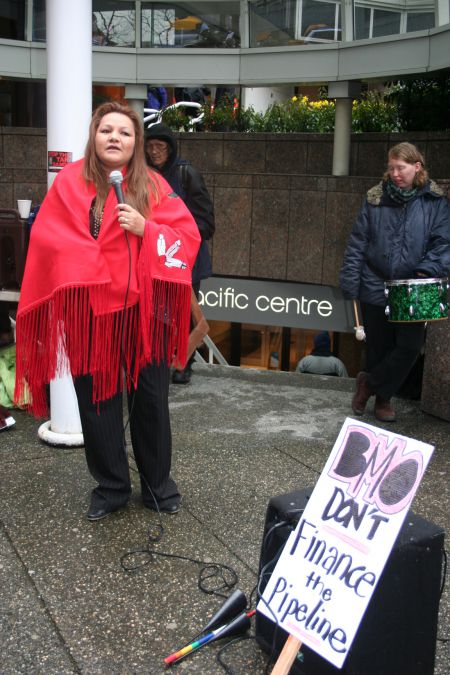
Yinka Dene Alliance spokesperson Geraldine Thomas-Flurer addresses the support rally after the BMO meeting. Vancouver, March 22, 2011. Photo: Sandra Cuffe
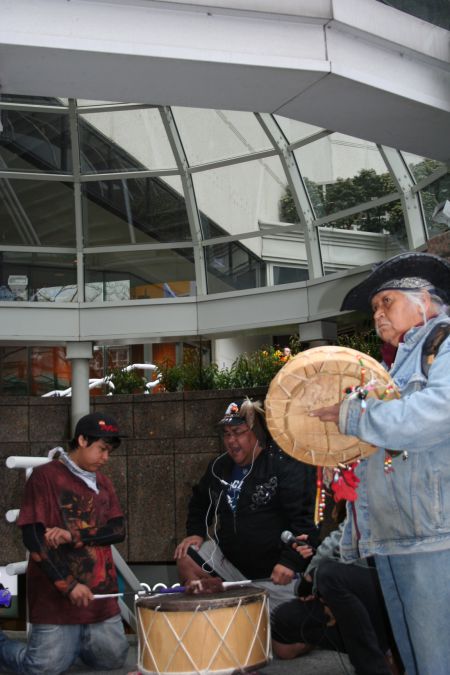
Dozens of Indigenous Nations publicly oppose the proposed Enbridge pipeline project; no First Nation has expressed its support. Vancouver, March 22, 2011. Photo: Sandra Cuffe
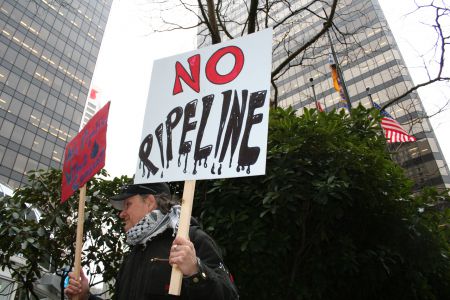
Rally in support of the Yinka Dene Alliance, against Northern Gateway project. Vancouver, March 22, 2011. Photo: Sandra Cuffe
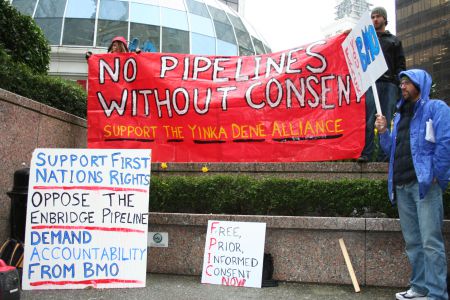
NO PIPELINES WITHOUT CONSENT banner in support of the Yinka Dene Alliance. March 22, 2011. Photo: Sandra Cuffe
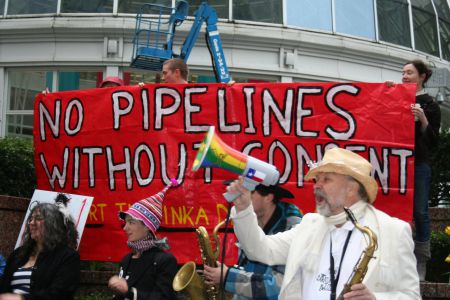
A carnival band energizes the Yinka Dene Alliance support rally. March 22, 2011. Photo: Sandra Cuffe
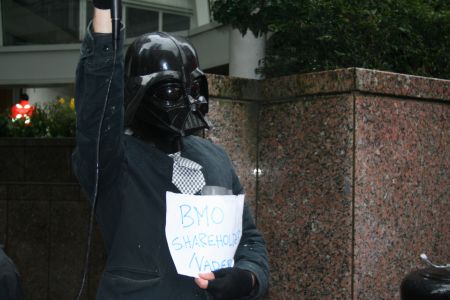
"BMO shareholder Vader" makes a surprise appearance at the rally outside the Four Seasons hotel. Vancouver, March 22, 2011. Photo: Sandra Cuffe
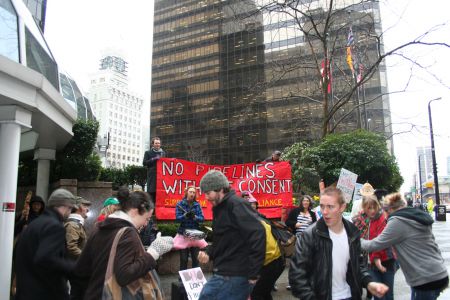
Dancing in the rain at the rally in against Enbridge's Northern Gateway pipeline project. Vancouver, March 22, 2011. Photo: Sandra Cuffe
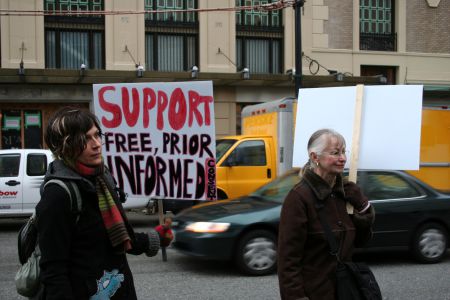
Free, Prior, and Informed Consent (FPIC) support at the Yinka Dene Alliance support rally. Vancouver, March 22, 2011. Photo: Sandra Cuffe
Also posted by SandraCuffe:
Also in Solidarity:
Vancouver, Coast Salish Territories – Dozens of people gathered downtown on March 22nd to rally against the proposed Enbridge Northern Gateway pipeline and in support of the Yinka Dene Alliance. Representatives from the Alliance voiced their position inside the Bank of Montreal's Annual General Meeting held at the Four Seasons Hotel.
"The banks should not raise funds for companies operating within Indigenous territories against the will of Indigenous peoples," stated Yinka Dene Alliance spokesperson Geraldine Thomas-Flurer in a media release circulated the morning of the AGM.
Nadleh Whut'en, Nak'azdli, Takla Lake, Saik'uz, and Wet'suwet'en First Nations - the Yinka Dene Alliance - intervened at the Bank of Montreal (BMO) annual shareholders meeting to tell the bank not to finance Enbridge or the company's Northern Gateway pipeline project. According to the Alliance, BMO has raised over $286 million for Enbridge and its related companies since 2007.
"We don't want Enbridge. We don't want pipelines. We don't want tankers on the coast," Telqua, a Wet'suwet'en grassroots activist, told rally participants gathered in front of the AGM.
If built, the proposed 1,200km Northern Gateway oil pipeline would transport half a million barrels of tar sands bitumen from Alberta to Kitimat, BC. The proposed twin pipelines' 30m-wide right-of-way would cross hundreds of rivers, streams, and watersheds along its route through numerous unceded Indigenous territories. The crude oil would then be transported on massive oil tankers through delicate coastal ecosystems and Indigenous territories, and then across the Pacific to Asian markets.
Despite a vigorous public relations campaign, Enbridge has been declared unwelcome and been issued notices of trespass in several attempted dialogue hearings and meetings. To date, no First Nation supports the pipeline; over 80 First Nations have publicly voiced their opposition to the Northern Gateway project.
“We have already suffered with fish dying on us this year,” said Telqua. “Why do the eagles have to live on the dump piles? What are they going to feed their children?” She added that it is not uncommon to see 30 eagles feeding on garbage out near Chilliwack. “And no one thinks a thing about it.”
“It's going to affect all of us, not just Indigenous people,” explained her husband and fellow Indigenous activist Frank Martin, from the Heiltsuk Nation along the central coast. The couple has been targeted by police forces – including violent physical attacks and detention – and the judicial system over decades of involvement in struggles against institutionalized racism and police brutality, and for traditional family territory and Indigenous sovereignty.
“We are unceded and we are on sacred lands,” Martin reminded the rally, “so we are asserting our jurisdiction.”
Many of the messages shared by Indigenous people at the rally echo those of the Save the Fraser Declaration of December 2010, signed and affirmed by 61 Indigenous Nations affected by and publicly opposing the Enbridge's Northern Gateway project. The five First Nations of the Yinka Dene Alliance are among those working for the unity of Nations from the Fraser River watershed to the coast against the oil pipeline.
“Our relationship with the watershed is ancient and profound, and our inherent Title and Rights and legal authority over these lands and waters have never been relinquished through treaty or war,” states the declaration.
“Let's stop this pipeline. We don't want this in our territories,” Telqua emphasized.
Energetic Vancouver-based Rainforest Action Network (RAN) activists organizing the rally to support the Yinka Dene Alliance's intervention in the meeting of BMO shareholders kept spirits high among those present with coffee, tea, a boisterous carnival band, and a touch of street theatre. Messages of solidarity were also shared through numerous Indigenous and non-Indigenous speeches, drums, and songs.
Despite the rain, the colourful banners and placards remained visible to the steady stream of traffic and pedestrians throughout the morning while the BMO meeting continued inside the hotel. Diverse messages against the tar sands, pipelines, and tankers were carried by rally participants; however, many focused on demands related to the international legal principle of Free, Prior, and Informed Consent (FPIC).
The result of decades of ongoing work and struggle by Indigenous Nations and organizations around the world, the United Nations Declaration on the Rights of Indigenous Peoples (UNDRIP) became a formal UN declaration in 2009, despite official opposition by the governments of Canada, the United States, Australia, and New Zealand.
In a federal government position paper outlining the official reasons behind Canada's vote in 2006 against one of the many draft versions of UNDRIP, the government revealed that “the concept of free, prior and informed consent is used in many contexts within the Draft Declaration. It could be interpreted as giving a veto to indigenous peoples over many administrative matters, legislation, development proposals and national defence activities which concern the broader population and may affect indigenous peoples.”
Despite a long history of opposition and qualifying statements, the government of Canada officially reversed its position in late 2010 and endorsed UNDRIP, in which article 32 establishes that States “shall consult and cooperate in good faith with the indigenous peoples concerned through their own representative institutions to obtain their free and informed consent prior to the approval of any project affecting their lands or territories or resources.”
The substantial difference between the Aboriginal rights to “consultation” and “reasonable accommodation” recognized by Canada and the international legal principle of FPIC for Indigenous Peoples lies at the heart of many struggles both within and outside the court system. While Indigenous challenges to Crown (both federal and provincial) jurisdiction itself in unceded territories continue, so do campaigns to highlight the role played by third-party corporations and investors.
“RBC stepped forward in 2010 by pledging to document whether its clients in high-impact sectors have policies and practices consistent with the Standard [of FPIC],” explains the Rainforest Action Network of a Royal Bank of Canada precedent, according to a flyer about BMO and Northern Gateway distributed at the rally.
“I’m pleased they were able to use the meeting to express a point of view,” said Bank of Montreal CEO Paul Downe of the Yinka Dene Alliance, according to a Vancouver Sun article the following day.
The Vancouver Sun also reported that “BMO has scheduled meetings with chiefs of the five communities [sic] represented in the group” and that Downe said of the meetings: “I think it will be a good, open exchange.”
“We come here as Indigenous sovereign people,” clarified Yinka Dene Alliance spokesperson Geraldine Thomas-Flurer, addressing the support rally after the BMO meeting. “We're not stakeholders.”
“Water is precious,” Thomas-Flurer told the rally. “Our grandmother told us when we were really young that if something happens to our water, it's over.”
“Our numbers may be small, but we are very loud,” added Yinka Dene Alliance representative Jasmine Thomas. “We are all together in this.”
“I think they heard our message over and over today,” said Thomas of the Bank of Montreal.
Whether or not BMO, other potential investors, or Enbridge itself ultimately decide to heed the message of the Yinka Dene Alliance and other Indigenous Nations, widespread united Indigenous opposition to the Northern Gateway pipeline project continues.
“Approximately one quarter of the proposed pipeline route passes through the traditional territories of the Yinka Dene Nations,” states the March 22 Yinka Dene Alliance media release.
“We will not allow the proposed Enbridge Northern Gateway Pipelines, or similar tar sands projects, to cross our lands, territories, and watersheds, or the ocean migration routes of Fraser River salmon,” explains the Save the Fraser Declaration, signed by 61 Indigenous Nations, including those of the Yinka Dene Alliance and others along the path of the proposed pipeline project.
“We are adamant and resolved in this declaration, made according to our Indigenous laws and authority. We call on all those who would place our lands and waters at risk – we have suffered enough, we will protect out watersheds, and we will not tolerate this great threat to us all and to all future generations,” concludes the document.
“We will not sacrifice our children,” explained Yinka Dene Alliance spokesperson Geraldine Thomas-Flurer. “Our elders and our children are depending on us.”
“It doesn't matter what they try to do... we're not going to give up,” concluded Thomas-Flurer before the rally dispersed. “We're going to stand up to the very end.”
Sandra Cuffe is a freelance journalist, Vancouver Media Co-op contributing member, and vagabond.
The site for the Vancouver local of The Media Co-op has been archived and will no longer be updated. Please visit the main Media Co-op website to learn more about the organization.
Commentaires
Another fantastic article!
This article is nothing short of amazing!
Surely the struggle of the first nations peoples in this colony called Canada are everyones struggles?
One must wonder, when is it enough? How long can we allow these warped systems of greed (pollute our water, land, turn people into cold hardened criminals whose only interest is money) to go on?
Thank you for such an indepth story Sandra Cuffe!
Keep them coming!
All my relations/Namaste
Tami Starlight - VMC Femininja & Editorial Collective (who likes herbal tea)
Oil leaks
I heard on CBC radio today that some pipeline company in Alberta has admitted they have approximately TWO LEAKS a week! Isn't that enough to pressure the powers to be that this is an insane idea?